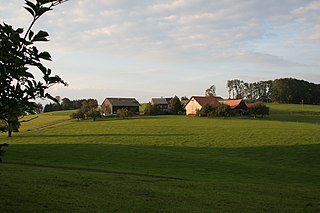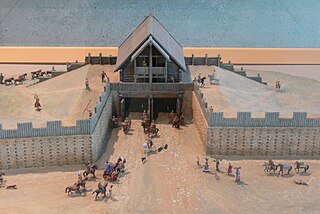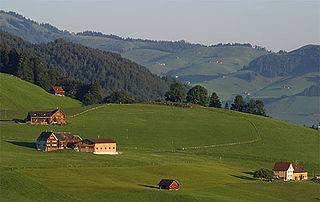
A ghost town is an abandoned village, town, or city, usually one that contains substantial visible remaining buildings and infrastructure such as roads. A town often becomes a ghost town because the economic activity that supported it has failed or ended for any reason. The town may also have declined because of natural or human-caused disasters such as floods, prolonged droughts, extreme heat or extreme cold, government actions, uncontrolled lawlessness, war, pollution, or nuclear disasters. The term can sometimes refer to cities, towns, and neighbourhoods that, though still populated, are significantly less so than in past years; for example, those affected by high levels of unemployment and dereliction.

A town is a human settlement. Towns are generally larger than villages and smaller than cities, though the criteria to distinguish between them vary considerably in different parts of the world.

A village is a clustered human settlement or community, larger than a hamlet but smaller than a town, with a population typically ranging from a few hundred to a few thousand. Though villages are often located in rural areas, the term urban village is also applied to certain urban neighborhoods. Villages are normally permanent, with fixed dwellings; however, transient villages can occur. Further, the dwellings of a village are fairly close to one another, not scattered broadly over the landscape, as a dispersed settlement.
Councils of Tasmania are the 29 administrative districts of the Australian state of Tasmania. Local government areas (LGAs), more generally known as councils, are the tier of government responsible for the management of local duties such as road maintenance, town planning and waste management.

Russia is divided into several types and levels of subdivisions.

An unincorporated area is a region that is not governed by a local municipal corporation. Widespread unincorporated communities and areas are a distinguishing feature of the United States and Canada. Most other countries of the world have either no unincorporated areas at all or these are very rare; typically remote, outlying, sparsely populated or uninhabited areas.

A hamlet is a small human settlement. In different jurisdictions and geographies, a hamlet may be the size of a town, village or parish, or may be considered to be a smaller settlement or subdivision or satellite entity to a larger settlement. The word and concept of a hamlet have roots in the Anglo-Norman settlement of England, where the old French hamlet came to apply to small human settlements. In British geography, a hamlet is considered smaller than a village and distinctly without a church or other place of worship. A hamlet may consist of a farm, mill or mine and all workers would generally be labouring here. There would be no, or if any, considerably basic services available to locals.

Urban-type settlement is an official designation for a semi-urban settlement, used in several Eastern European countries. The term was historically used in Bulgaria, Poland, and the Soviet Union, and remains in use today in 10 of the post-Soviet states.

An oppidum is a large fortified Iron Age settlement or town. Oppida are primarily associated with the Celtic late La Tène culture, emerging during the 2nd and 1st centuries BC, spread across Europe, stretching from Britain and Iberia in the west to the edge of the Hungarian plain in the east. These settlements continued to be used until the Romans conquered Southern and Western Europe. Many subsequently became Roman-era towns and cities, whilst others were abandoned. In regions north of the rivers Danube and Rhine, such as most of Germania, where the populations remained independent from Rome, oppida continued to be used into the 1st century AD.

The administrative divisions of Ukraine are subnational administrative divisions within the geographical area of Ukraine under the jurisdiction of the Ukrainian Constitution. Ukraine is a unitary state with with three levels of administrative divisions: 27 regions, 136 raions and 1469 hromadas.

Populated places in Estonia, are cities or settlement units of rural municipalities, but only cities have administrative functions. Settlement units are divided into settlements and urban regions.
The classification system of inhabited localities in Russia and some other post-Soviet states has certain peculiarities compared with those in other countries.

In geography, statistics and archaeology, a settlement, locality or populated place is a community in which people live. The complexity of a settlement can range from a minuscule number of dwellings grouped together to the largest of cities with surrounding urbanized areas. Settlements may include hamlets, villages, towns and cities. A settlement may have known historical properties such as the date or era in which it was first settled, or first settled by particular people.

A community settlement is a type of village in Israel and the West Bank. While in an ordinary town anyone may buy property, in a community settlement the village's residents are organized in a cooperative. They have the power to approve or veto a sale of a house or a business to any buyer. Residents of a community settlement may have a particular shared ideology, religious perspective, or desired lifestyle which they wish to perpetuate by accepting only like-minded individuals. For example, a family-oriented community settlement that wishes to avoid becoming a retirement community may choose to accept only young married couples as new residents.

A dispersed settlement, also known as a scattered settlement, is one of the main types of settlement patterns used by landscape historians to classify rural settlements found in England and other parts of the world. Typically, there are a number of separate farmsteads scattered throughout the area. A dispersed settlement contrasts with a nucleated village.

Phellus is a town of ancient Lycia, now situated on the mountainous outskirts of the small town of Kaş in the Antalya Province of Turkey. The city was first referenced as early as 7 BC by Greek geographer and philosopher Strabo in Book XII of his Geographica, alongside the port town of Antiphellus; which served as the settlement's main trade front.
Town of district significance is an administrative division of a district in a federal subject of Russia. It is equal in status to a selsoviet or an urban-type settlement of district significance, but is organized around a town ; often with surrounding rural territories.













